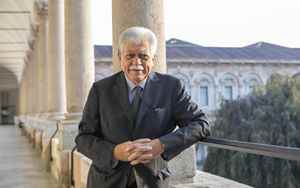(Finance) – Is the PNRR really the last train for the relaunch of the South, and, consequently, of the country? Telebag he asked Stefano Rolandoprofessor of public and political communication at the IULM University of Milan and president of the Foundation “Francesco Saverio Nitti”, economist and politician who cared deeply about the Southern question.
“I believe that the historical chain of policies for the South is made up of” last resort “documents, which have focused more on symptoms than on causes, more on the last mile than on historical roots, more on the emergency (closure of companies, employment crisis , natural disasters, black hole of the underworld, etc.) and on the role vision connected to the Euro-Mediterranean development scheme. it is neither a palliative, nor a thing that happens every year. In the conference “South & North-Villa Nitti shortens the distances “ that we held (together with Fondazione Merita, with over 60 speakers) in Maratea in recent days, the theme has been the subject of many interventions. In summary: yes to the “great opportunity”, but only if the system vision remains firmly in the hands of a government policy that does not yield to particularism or to opaque interests; and for “vision” it is not a question of getting old projects out of the drawers without any evidence, but devising pieces that keep infrastructural modernization and strategic social and training investments in balance “.
A third of the Italian population lives in the South but just over a fifth of GDP is produced, just one tenth of national exports originate from the southern regions and only 3 out of 10 women work: these are just some of the data that emerged from the “South & North” conference – Phase change “which took place in Maratea, at Villa Nitti, from 24 to 26 June. What must be done to concretely reverse the course?
“Reverse the course, shorten distances, avoid breaking up. A century of conference headlines, newspaper headlines, sometimes memorable essay headlines. Certainly this short answer of mine will not say something new. But in the conference of Villa Nitti (second edition) some steps forward have been made in method. Even the history of the Cassa del Mezzogiorno demonstrates that the economic-productive question and the cultural-educational question walk in strategic parallel. If the reorganization of the training offer, together with a full participation in the digital transition process are not part of system southernism (that is, which becomes national politics) neither the large amount of money nor the many discussions on the priorities of a bridge, a motorway or a port system will be enough. , it is necessary to work – in parallel with the feasibility selection of the projects that can be financed – on the reduction of stereotypes that weigh on the public debate co and on the representation of themes. The Italians (from the Alpine troops of Valtellina to the seafarers of Lampedusa) have the habit of enjoying their own stereotypes, that is, without being ashamed, as many civilized peoples do. Here the internal enemy lurks and the reduction is not given by the Eternal Father, but a cultural planning generated by a modern civic spirit. A driving force – it is a cue contained in the question – can come from the civilian strength of women in particular centered on the relationship between employment and dignity. Proposing this theme to South-North solidarity should count on interesting potential synergies “.
The recent data published by ISTAT recently confirm that in our country the numbers relating to absolute poverty are stable compared to 2020, but it is growing in the South. energy costs. How real is the risk of further dividing the country rather than reducing the North-South distances?
“There are some aspects of” poverty “that are part of the extension of traditional trends. The first is precarious employment managed by old and new gangsters. The second is the entry into the labor market of young people and especially young women who they do not have room for free negotiation on their abilities and their curricula, but they depend on often unworthy sponsorships. The third is the product of functional illiteracy, which make half of the citizens of the South an area that could not even be in tune with this question and this reply.
I go back to the previous reasoning to say that in parallel to the planning that the PNRR promotes, a powerful work of “public explanation” is needed so that this cycle of new financial resources is not experienced as a “hand of God that comes from heaven”, but as a painting of opportunity supported by clarifications on the real meaning of the programs (explain, explain, explain) and above all by showing what can and must be done in parallel to remove the medieval obstacles I mentioned “.
